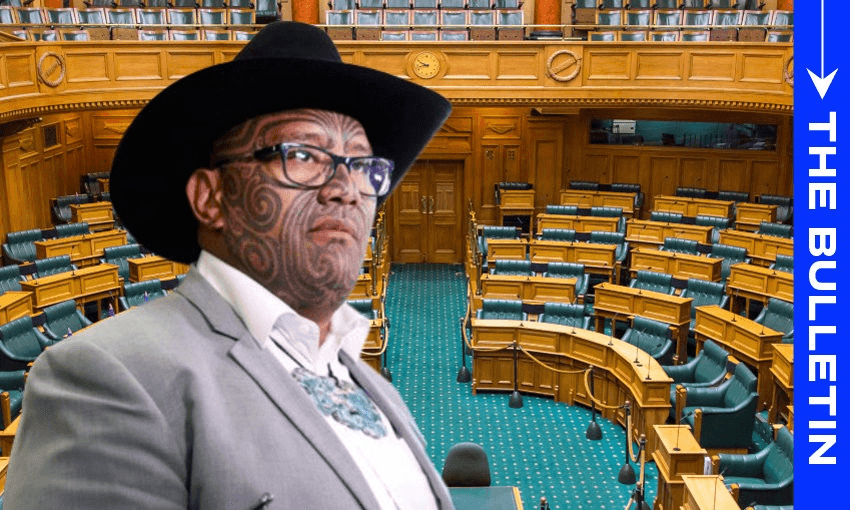Te Pāti Māori hits a high, but not at the expense of Act, writes Stewart Sowman-Lund for The Bulletin.
To receive The Bulletin in full each weekday, sign up here.
Te Pāti Māori hits poll high
We’re rapidly heading towards the end of the political year, and one party in particular has received an early Christmas present. Two polls released yesterday showed Te Pāti Māori jumping in popularity after a high profile month that saw the country’s biggest ever protest arrive on the forecourt of parliament and the introduction of a highly controversial piece of legislation, the treaty principles bill. The latest 1News Verian poll, reported here by political editor Maiki Sherman, had the two major parties steady – National on 37% and Labour trailing on 29%. The Greens were down two to 10% (we talked about their challenging year in some depth yesterday morning), and Act was steady on 8%. But Te Pāti Māori was up three points to 7%, the party’s highest result in a 1News poll ever and well above its previous record of 4.4% back in 2008 when the party was incredibly different. It placed them ahead of New Zealand First on 6%, though the current coalition would still be in a position to form a government with 63 seats to the opposition’s 57.
Meanwhile, a Curia poll for the Taxpayers’ Union also had Te Pāti Māori three points up on 5.5%, reported RNZ, though the overall numbers showed National and Act wouldn’t even need New Zealand First’s support to form a government. So, no change of government from either poll – but that’s not the most interesting part.
‘A lot of publicity’
While neither poll would mean a change in government, Te Pāti Māori will undoubtedly be pleased with its rise in popularity. This is only its second term back in parliament after being turfed out altogether in 2017 when Labour swept the Māori seats. On both these latest poll results, Te Pāti Māori would still be in parliament with or without any electorates – the party has never polled above 3.08% in any general election. In comments to 1News, the leaders of both Labour and Act were sceptical the numbers would stay high for long. “They’ve had a lot of publicity over the last few weeks,” said Chris Hipkins. “It’s boosted their attention,” said David Seymour in reference to the recent nationwide hīkoi. “But attention is always followed by scrutiny.”
Unless the polls shift substantially over the next two years, Hipkins is going to need Te Pāti Māori to have any chance of forming a coalition – indeed, the three opposition parties have been more unified than usual in recent months. However, Labour will be wary of having its own support eaten away. The near sweep for Te Pāti Māori in the Māori electorates at the last election came as something of a surprise to Labour, as Aaron Smale looked at for Newsroom here.
Sucking up the oxygen
The flipside of this is that Act – the party on the opposite end of the treaty principles debate that has likely boosted Te Pāti Māori – hasn’t suffered in either of these polls. It was steady in the 1News survey, around the same result it received at the election. Curia had the party up 4.5%. It reflects what commentators have previously suggested about the debate over the treaty principles bill and the protests in response to it: that both parties will attempt capitalise on it. The Spinoff’s Toby Manhire, attempting to prove whether or not Act has had “disproportionate” influence in the coalition as Seymour recently claimed, looked at public interest in the three government parties on Google. It showed that over recent weeks, as the debate over the treaty principles bill raged on, searches for Act and Seymour spiked significantly. Dan Brunskill, writing for Interest, said that Seymour had “staked the success of the bill on his ability to win a public argument, in the ancient Athenian style, and cause National to cave under the pressure”.
National has largely bowed out of that argument, with PM Christopher Luxon consistently repeating his view that the bill is divisive but otherwise avoiding to be dragged deeper in (and he was not present in parliament for the bill’s first reading). One of his MPs, James Meager, is in charge of the justice committee that will oversee the public consultation process of the doomed bill and has pledged to keep the process neutral, he told Toby Manhire on Gone by Lunchtime. “In this instance, that might be slightly different, because everyone has their positions laid out and they will not change, but it is still, I think, worth having the conversation when it comes before us and treating it with the respect that you treat any other piece of legislation.”
Poll shows majority support for Aukus
Meanwhile, a very different poll released this morning shows support for the government joining pillar two of the Aukus security pact, reported Andrea Vance for The Post. According to the Freshwater Strategy poll, a slim majority – 51% – back moves to sign up to Aukus, while 20% are opposed. It’s worth noting that 29% were either unsure or listed their response as “neither”. Supporters of the coalition government are more likely than other party voters to support pillar two, and men are more likely than women to approve. Last week, as we talked about, Labour ruled out joining Aukus should it become government again in 2026 and pledged to pull New Zealand out of the agreement if the coalition gets us in there before then.
*Editor’s note: An earlier version of this mistakenly said this was Te Pāti Māori’s second term back in government, not parliament. This has been corrected.
